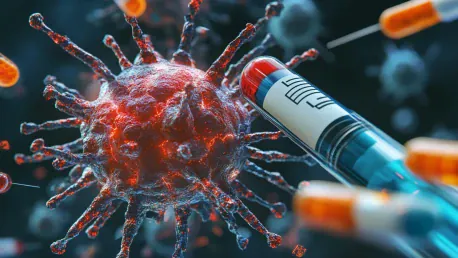The fight against advanced prostate cancer has taken a promising turn with the development of a new drug, NXP800. This innovative treatment aims to help patients for whom current therapies have become ineffective. By specifically targeting the heat shock factor 1 (HSF1) pathway, NXP800 addresses the root causes of treatment resistance, which remains a significant challenge in advanced cancer therapies. The potential for this drug to bypass common mutations that lead to drug resistance is a groundbreaking development in the fight against this disease.
The Science Behind NXP800
Scientists at the Institute of Cancer Research in London have been at the forefront of this groundbreaking research. NXP800 targets the HSF1 pathway, which cancer cells use as a defense mechanism to thrive under harsh conditions. The HSF1 pathway is crucial for the growth and survival of cancer cells, making it a primary target for new treatments. By interrupting this pathway, NXP800 offers a novel method for combating advanced prostate cancer without succumbing to the typical mutations that render current therapies ineffective.
Dr. Adam Sharp, leader of the Translational Therapeutics Group at the Institute, has emphasized the inevitability of drug resistance in hormone therapies. This problem underscores the need for new approaches like NXP800. By focusing on the heat shock response pathway, NXP800 represents a departure from traditional strategies, offering a method to potentially circumvent the mutations responsible for drug resistance. This approach might significantly reshape the landscape of advanced prostate cancer treatment, improving patient outcomes in ways previously deemed unattainable.
Promising Research Findings
Research demonstrated that NXP800 could significantly slow the growth of prostate cancer cells, even in cases resistant to enzalutamide, a common hormone therapy. Higher levels of heat shock proteins in prostate cancer cells were linked to increased androgen receptor signaling, a critical factor in the disease’s progression. The presence of these proteins is indicative of the cancer’s ability to withstand adverse conditions, further highlighting the importance of the HSF1 pathway in cancer cell survival.
When treated with NXP800, a notable reduction in the growth rate of prostate cancer tumors was observed. This reduction was consistent across lab-grown cells and miniature tumors derived from patient samples. These promising results suggest that NXP800 could become a game-changer in the treatment of advanced prostate cancer. The consistency of these findings across different test models underscores the reliability and potential effectiveness of the drug, paving the way for more comprehensive clinical trials to further validate these results.
Clinical Implications and Future Prospects
The significance of this research is underscored by Professor Kristian Helin, chief executive at the Institute of Cancer Research. He pointed out that drug resistance is one of the most critical challenges in cancer treatment. Johann de Bono, a colleague of Helin, observed that prostate cancer patients with elevated heat shock protein levels generally have poorer outcomes. This underscores the potential impact NXP800 might have if it proves effective in clinical trials, offering hope for significantly improved patient prognoses.
NXP800 has received fast-track designations from the US FDA to expedite its development for various cancers, including ARID1a-deficient ovarian, fallopian tube, peritoneal cancers, and the rare bile duct cancer. This accelerated development pathway highlights the drug’s potential to impact the treatment landscape significantly. If clinical trials confirm its efficacy, NXP800 could revolutionize the approach to treating these cancers, providing much-needed options for patients with few alternatives.
Support and Funding for Continued Research
The study’s findings were backed by funding from organizations such as Prostate Cancer UK, Movember, and the Prostate Cancer Foundation. Simon Grieveson, assistant director of research at Prostate Cancer UK, remarked on the critical need for continued research into new treatment approaches. Given the eventual ineffectiveness of hormone therapies for advanced prostate cancer, this novel insight could pave the way for the development of new, more effective therapies.
Grieveson stressed that this research represents a fantastic example of how novel insights can catalyze the development of new treatments. Using the analysis of 439 advanced prostate cancer samples, researchers established a clear link between high levels of heat shock proteins and worse clinical outcomes. This relationship, driven by increased androgen receptor signaling, underscores the potential of NXP800 to significantly impact overall treatment results and patient survival rates.
Next Steps and Potential Impact
The battle against advanced prostate cancer has seen a promising breakthrough with the introduction of a new drug, NXP800. This cutting-edge treatment is designed to assist patients whose current therapies have lost effectiveness. Specifically, NXP800 targets the heat shock factor 1 (HSF1) pathway, thereby addressing the underlying causes of treatment resistance—a significant hurdle in advanced cancer therapies. The drug’s potential to circumvent common mutations that typically lead to drug resistance marks a revolutionary advancement in combating this disease. This innovation is especially crucial for those who have exhausted existing treatment options, offering a new glimmer of hope in what often seems like a bleak landscape. Advanced prostate cancer patients face numerous challenges, and the development of NXP800 could offer much-needed relief by providing an alternative that works when other treatments fail. Overall, this groundbreaking drug signifies a pivotal moment in the ongoing fight against one of the most persistent and difficult-to-treat forms of cancer.









